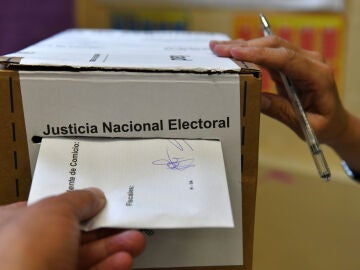
With a population of almost 46 million inhabitants, Argentina faced each other on Sunday October 22 to the first round of key elections, from which the next president of the Republic will be elected, who will govern the country for the next four years. Of all of them, 34,898,212 had been called to the polls, but the Participation in these elections has been 77.65%, according to data provided by the Ministry of the Interior. Some may be surprised by the figure, considering that voting in Argentina is mandatoryunlike what happens in many other countries, such as Spain, where voting is a rightnot an obligation.
The truth is that in democratic Argentina, the participation data has always been around these numbers, perhaps somewhat higher at the beginning of democracy, but it has never been 100%. The highest turnout in recent Argentine history took place in the first presidential elections held after the National Reorganization Process, following the regime of the last Argentine dictator, Reynaldo Benito Antonio Bignone. In those elections, held in October 1983, the 85.61% of Argentine voters He went to the polls, which gave victory to the first post-dictatorship president of Argentina, Raúl Alfonsín.
During the first years of democracy, participation in the different electoral processes remained above (or very close to) 80%, until the legislative elections of 2001 – during the Government of Fernando de la Rúa – when participation fell to 75%. .47%. In the last 40 years, only once has a participation below 70%: in the 2021 PASO (primary, open, simultaneous and mandatory) elections, primaries that took place in the context of the Covid-19 pandemic around the world, when only 67.78% of voters turned out lets vote.
Are there people exempt from voting in Argentina?
Following Argentine legislation, and although based on voting yes is mandatory in Argentina, it must be taken into account that there are many people exempt from voting. A priori, all people between 18 and 70 years old are obliged to vote, unless they can justify before the National Electoral Justice the reason for not casting the vote. Some of these exemptions are the following:
- People who, for whatever reason, find themselves more than 500 kilometers away from the place where you should votejustifying it to the nearest police authority (and with reasonable reasons).
- People sick or disabled for reasons of force majeure, sufficiently proven and justified before doctors of the national health service.
- People who work in public service organizations or companies and who, for reasons related to the fulfillment of their duties, cannot go to vote.
- The judges or assistants who, by provision of the National Electoral Code, have to attend their office and keep it open during the electoral process.
The fine for not voting in the elections in Argentina
If a citizen has not been able to go to vote, he or she has 60 days period to justify it. If this is not done (or the justification is not accepted), the voter will receive a penalty fee, in addition to a sanction that prevents him from being appointed to perform public functions or jobs for three years. It must also be taken into account that if a person did not vote in the primaries (STEP), it does not mean that he cannot vote in the general elections. In fact, it is mandatory to do so.
According to Argentine electoral legislation, “failure to cast a vote” is subject to a fine ranging from 50 to 500 pesosin addition to being included in what is known as the Registry of Offenders.
In addition to these sanctions, people who do not go to vote but do not pay the corresponding fine They will not be able to carry out procedures or procedures before the national, provincial and Autonomous City of Buenos Aires state agencies for one year.
Source: Lasexta
Ricardo is a renowned author and journalist, known for his exceptional writing on top-news stories. He currently works as a writer at the 247 News Agency, where he is known for his ability to deliver breaking news and insightful analysis on the most pressing issues of the day.












